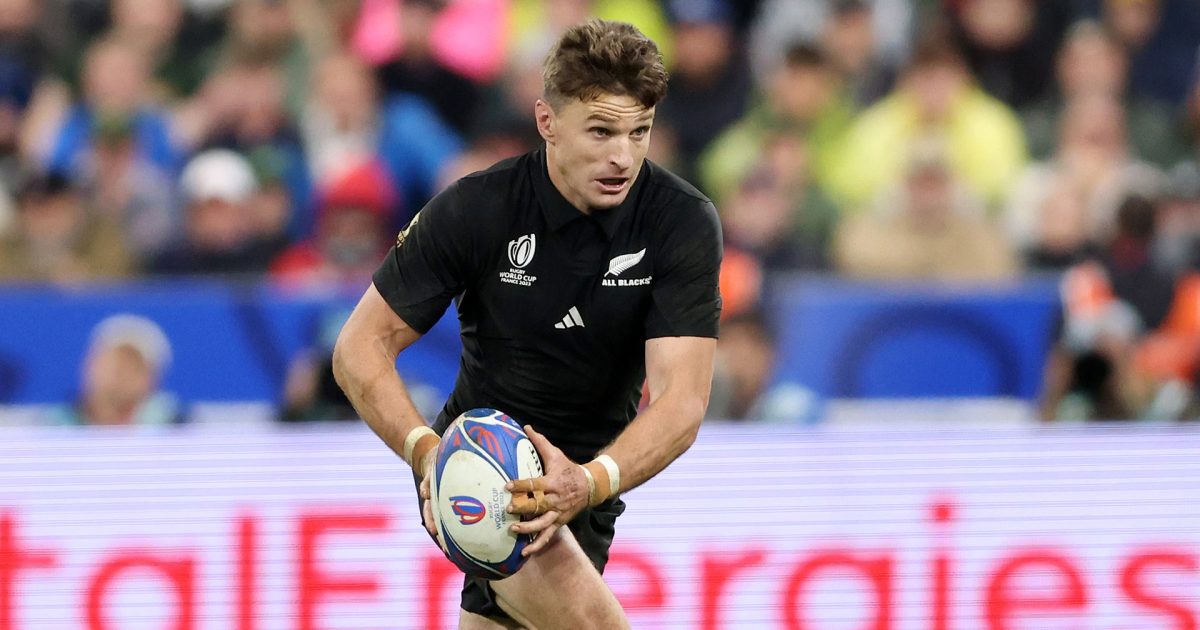Beauden Barrett re-signe pour les All Blacks jusqu'en 2027

Beauden Barrett a re-signé avec le New Zealand Rugby un contrat de quatre ans qui lui permettra de poursuivre sa carrière chez les All Blacks.
L’actuel arrière des All Blacks s’est engagé avec Toyota Verblitz sur un contrat d’un an pour la saison 2023/24 de Japan Rugby League One qui débute le week-end prochain.
Barrett retournera en Nouvelle-Zélande après sa saison au Japon et sera immédiatement disponible pour la sélection des All Blacks en 2024, tandis qu’il reviendra aux Blues pour le Super Rugby Pacific en 2025.
Ce contrat exceptionnel de quatre ans permettra à Barrett de compléter ses 123 sélections internationales jusqu’à la prochaine Coupe du Monde de Rugby qui se jouera en 2027 en Australie, ce qui, selon lui, a été le facteur de motivation de sa re-signature.
« C’est un immense privilège de revêtir le maillot noir et je ne le considérerai jamais comme acquis », a-t-il déclaré.
« Je suis toujours passionné par l’idée de jouer aux côtés de mes frères Scott et Jordie pour les Coastal, Taranaki ou les All Blacks, alors j’ai hâte d’apporter ma contribution dès mon retour du Japon. »
Déjà dans un coin de sa tête avant d’aller au Japon
« J’ai adoré le temps que j’ai passé sous le maillot des Blues jusqu’à présent et j’ai hâte de retrouver le club à mon retour en Nouvelle-Zélande », a-t-il ajouté.
« Pour ma famille et moi, Auckland est devenu notre maison, même si Taranaki restera toujours dans mon cœur. J’ai apprécié le temps que j’ai passé avec les Blues et je sais que nous pouvons obtenir des résultats qui reflètent le talent que nous avons dans l’équipe.
« Je suis toujours extrêmement motivé pour gagner des championnats avec cette équipe et c’est là que se trouve mon objectif. J’ai rencontré des gens formidables qui soutiennent les Blues et nous partageons la même vision pour cette équipe. »
La signature de Beauden Barrett au Japon intervenait en même temps que celle d’Aaron Smith début février 2023. Les deux joueurs sont d’ailleurs arrivés ensemble ces derniers jours dans leur club de Toyota Verblitz.
Ce retour en Nouvelle-Zélande était déjà dans un coin de sa tête lorsqu’il précisait dans un communiqué en début d’année : « je veux prendre mon temps et m’assurer que je prends la bonne décision et, une fois que j’y verrai plus clair, je serai en mesure de faire le point sur mon avenir après 2024 ».
Beauden Barrett fait partie intégrante du succès des All Blacks depuis ses débuts en 2012, inscrivant 734 points et 43 essais au cours d’une carrière qui compte un titre de champion du monde en 2015.
Débutant pour les Blues en 2020 contre son ancienne équipe de Super Rugby, les Hurricanes, Barrett a joué 30 matchs sous le maillot des Blues, marquant 199 points pour l’équipe.
Le deux fois sacré Joueur World Rugby de l’Année a été le seul à inscrire un essai lors de la finale de la Coupe du Monde de Rugby, alors que les All Blacks ont terminé vice-champions du monde à un point en France.
Une nouvelle chance d’être double champion du monde
Grâce à son nouveau contrat avec la fédération néo-zélandaise de rugby, Beauden Barrett aura une nouvelle chance de remporter une deuxième Coupe du Monde de Rugby en 2027 en plus de sa médaille de vainqueur de l’édition 2015.
Pour y parvenir, le sélectionneur des All Blacks, Scott Robertson, s’est dit reconnaissant de pouvoir compter sur les services de Barrett.
« Beauden apporte énormément de classe à l’équipe », a-t-il souligné. « Ce n’est pas pour rien qu’il est le deuxième arrière des All Blacks le plus capé de l’histoire et le fait d’avoir ses connaissances et son expérience dans notre rugby est le reflet de sa loyauté. »
« C’est génial qu’il revienne l’année prochaine et qu’il puisse poursuivre sa carrière avec les All Blacks tout en jouant pour les Blues l’année suivante, contribuant ainsi au succès durable du rugby en Nouvelle-Zélande », a commenté Mark Robinson, le directeur général de New Zealand Rugby.
« Toute prolongation de contrat est l’occasion de faire le point sur le temps passé par un joueur au club et la finalisation de ce contrat a donné aux Blues et à Beauden l’opportunité de faire le point sur le chemin parcouru et de s’engager sur la vision que nous avons pour l’équipe et le club.
« Nous savons que Beauden a le sentiment d’avoir un travail inachevé ici aux Blues et nous sommes convaincus qu’il reviendra avec le feu au ventre pour faire avancer le club sur et en dehors du terrain », a salué de son côté Andrew Hore, CEO des Blues.


